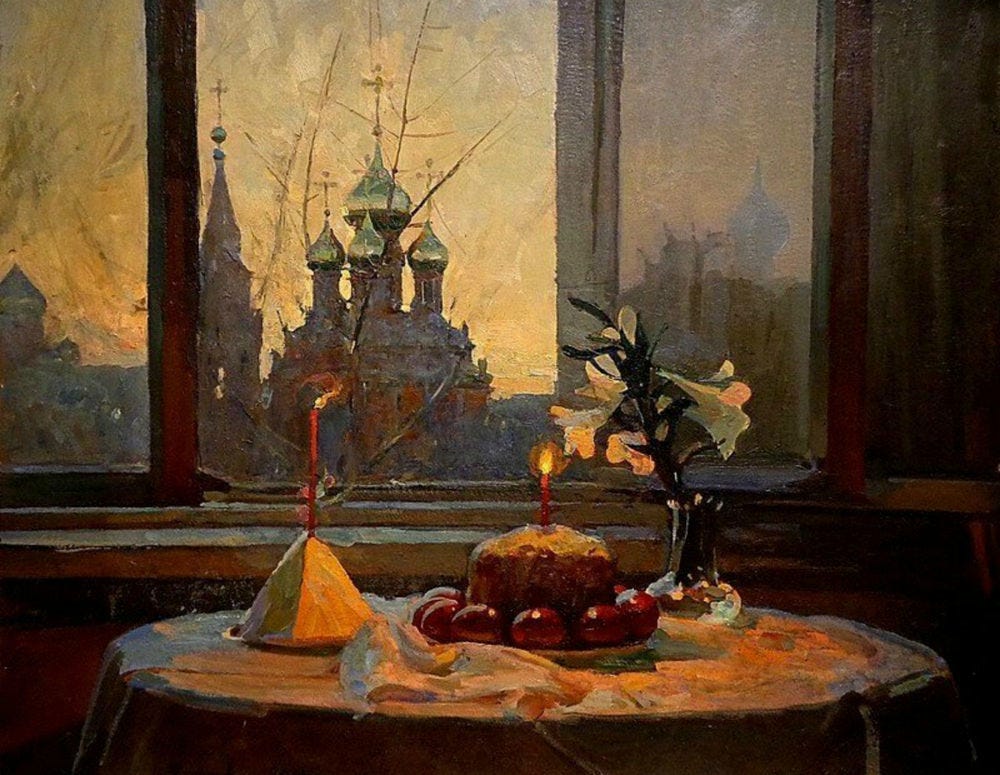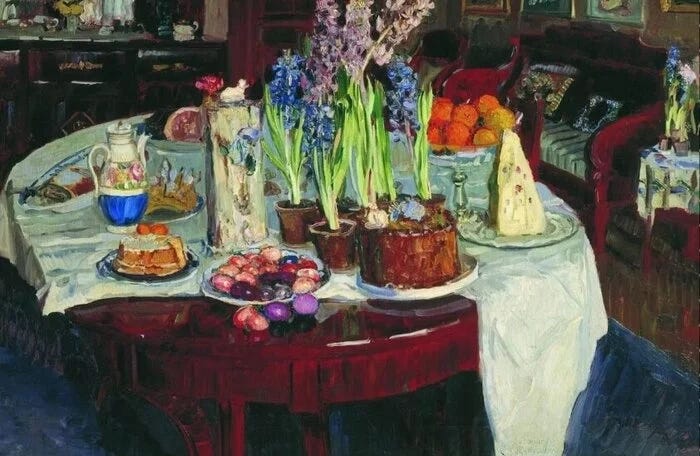С праздником Светлой Пасхи!
devoted to my Sage
Эта Easter (Пасха) is exceptionally beautiful. Этот year’s been quite tough and full of profound emotions and poignant feelings. What will next week, next month bring us?
In the Eastern Orthodox Church у русского человека особое восприятие1 жизни. Human fate, — as a test and temptation that endured, — allows a person to rise to the spiritual height destined for them — that’s the interpretation of the tragic in life. It demands скорби и сострадания2, and it concludes with the resurrection of a transformed person3 or with окончательной death, небытием4, the turning to dust of one who hasn’t overcome the trial of life due to immense moral deformation and inner spiritual barrenness.
Honestly, were it not for my Sage, I wouldn’t have undergone such a transformation, let alone write any of it here. May each of you, дорогие читатели, have someone like that in your life, who guides you like a lighthouse through stormy weather.
Do you remember the ideals I’ve mentioned in the Beauty will save the world newsletter? Don’t strive for forms and wrappings like Judas and his 33 golden pieces. The very thoughts on the ideals of Madonna and Sodom you can hear from Tatiana Kasatkina. Послушай, как она говорит об этом. She pronounces literally the very same phrases I used in that newsletter, so #gameofnoticing is in operation. All the novels of Dostoevsky have a motif of overcoming tragedy by passing through it reigns. So you can boldly say his texts carry an Easter-like spirit. When it comes to the phrase “pain and suffer are inevitable”, you know exactly what it means. :) Perhaps that’s the very reason his words resonate so deeply with me.
Yes, I’m trying настроить тебя на5 a special mood. Actually, all these religious feasts made sense to me and are now deeply intertwined with a special book, которую я прочитала год назад и написала пост here: The summer of the Lord by I.S. Shmelyev6.
I have for you a couple of excerps from the chapter Easter из этой же книги. The main characher is a 7-year-old boy. It is a very autobiographical book about the times before the 1917 Russian revolution.
В булочных — белые колпачки на окнах с буковками — X. В. Даже и наш Воронин выставил грязную картонку: «Принимаются заказы на куличи и пасхи и греческия бабы!» Бабы7?.. И почему-то греческие!
In the bakeries, little white caps with the letters “X. B.” (Christ is Risen!) are displayed in the windows. Even our Voronin has put out a dirty cardboard sign: “Taking orders for kulichi, paskhas, and Greek babas!” Babas? And why Greek, I wonder?
How many adjectives are there?:) what genders do they belong to?8
Я несу от Евангелий страстную свечку, смотрю на мерцающий огонёк: он святой. Тихая ночь, но я очень боюсь: погаснет! Донесу — доживу до будущего года. Старая кухарка рада, что я донёс. Она вымывает руки, берёт святой огонёк, зажигает свою лампадку, и мы идём выжигать кресты. Выжигаем над дверью кухни, потом на погребице, в коровнике...
I carry the Passion candle9 from the Gospels and watch its flickering flame: it is holy. The night is quiet, but I’m so afraid: what if it will go out? If I make it home with it still burning, I’ll live to see the next year. The old cook is glad I managed to bring it back. She washes her hands, takes the holy flame, lights her lamp with it, and we go to burn the crosses. We burn them above the kitchen door, then in the cellar, and in the cowshed...
How many verbs are in the text indicating future?10
Кажется мне, что на нашем дворе Христос. И в коровнике, и в конюшнях, и на погребице, и везде. В чёрном крестике от моей свечки — пришёл Христос. И всё — для Него, что делаем. Двор чисто выметен, и все уголки подчищены, и под навесом даже, где был навоз. Необыкновенные эти дни — страстные11. Христовы дни. Мне теперь ничего не страшно: прохожу тёмными сенями — и ничего, потому что везде Христос.
It seems to me that Christ is in our yard. In the cowshed, in the stables, in the cellar and everywhere. In the black cross I burned with my candle — Christ has come. And everything we do, we do for Him. The yard has been swept clean, every corner scrubbed, even under the shed where the manure used to be. These days are extraordinary — Holy Week. Christ’s days. Now I’m not afraid of anything: I walk through the dark hallways — and nothing frightens me, because Christ is everywhere.
Великая Суббота, вечер. В доме тихо, все прилегли перед заутреней. Я пробираюсь в зал — посмотреть, что на улице. Народу мало, несут пасхи и куличи в картонках. В зале обои розовые — от солнца, оно заходит. В комнатах — пунцовые лампадки, пасхальные: в Рождество были голубые?.. Постлали пасхальный ковёр в гостиной, с пунцовыми букетами. Сняли серые чехлы с бордовых кресел. На образах веночки из розочек. В зале и в коридорах — новые красные «дорожки». В столовой на окошках — крашеные яйца в корзинах, пунцовые: завтра отец будет христосоваться с народом12. В передней — зелёные четверти с вином: подносить. На пуховых подушках, в столовой на диване — чтобы не провалились! — лежат громадные куличи, прикрытые розовой кисейкой, — остывают. Пахнет от них сладким теплом душистым.
О, незабвенный вечер, гаснущий свет за окнами...Holy <Great> Saturday, it’s evening. The house is quiet; everyone has taken a nap before the midnight service. I slip into the hall to see what’s happening outside. There aren’t many people; they’re carrying paskhas and kulichi in cardboard boxes. In the hall, the wallpaper is pink from the setting sun. In the rooms, crimson vigil lamps glow — Easter ones: at Christmas, weren’t they blue? They’ve laid down the Easter carpet in the sitting room, with crimson bouquets. The gray covers have been removed from the burgundy armchairs. On the icons, little wreaths of rosebuds. In the parlor and hallways — new red runners. In the dining room windows — dyed eggs in baskets, crimson ones: tomorrow, Father will exchange Easter greetings with the people. In the front hall — green jugs of wine, ready to be served. On feather pillows, on the dining room sofa — so they don’t sink in! — lie enormous kulichi, covered with pink gauze, cooling. They smell of sweet, fragrant warmth.
Oh, unforgettable evening, with the fading light beyond the windows...
Oh man, his writing style is so intoxicating and delicious. Every year, I find myself in awe of Sunday mornings — the sky is always so blue on Easter. I hope, the blue sky is above your head today, too.
Светлой Пасхи тебе в сердце! May the light of Easter shine in your heart, my dear reader!13 ✨
special perception <of life>
<требует (кого?что? винительный падеж)> sorrow and compassion
У каждого есть свои слои — когда начинаешь снимать внешнюю шелуху, добираешься до настоящего человека. = Everyone has their own layers — once you start peeling away the surface, you get closer to their true self.
final <death>, non-existence
to set you in
What a beautiful work I’ve found referring to the translation of another of his works The Mercy of Saint Seraphim. Saint Seraphim himself, born in Kursk, is well-known all across the world (as far as I’m aware at the moment :).
If you call a woman as баба you refer to her well-rounded body and that is rather offensive, actually. However, in this case the word refers to a specific type of bun. I’ve come across another example of dessert called the Neapolitan baba which is bloody popular in Russia, too. We call it Ромовая баба — a Rum Baba.
ANSWER: белые (white) is adjective in plural, in singular — белый <колпачок> has a masculine gender;
<выставил (кого?что?винительный падеж)> грязную <картонку> — картонка has a female gender therefore грязная картонка is in Nominative case.
греческия — old-fashioned spelling, today we say — греческие <бабы>.
again, you see plural, баба has a female gender and again, here we deal with Accusative case.
People try to carry these candles home while they’re still lit as if bringing into their homes the prayerful mood that arises during the reading of the Gospel about the sufferings of Jesus Christ. Now, as I track down in my memory lane, I recall how blooming difficult it was just to litght the candle, waiting for the Holy water to be sprinkled. The priest marked our food with it, prepared for the upcoming three mornings.
ANSWER: : погаснет, донесу, доживу. Notice the prefixes that are responsible for motion (reach out, дотянуться, пойти…)
In the context of «страстные» actually means “suffering”. In Christian tradition, “Passion” specifically refers to the suffering and death of Jesus Christ. It’s a term that captures the intensity of Christ’s sacrifice, his pain, and his ultimate redemption. In Russian Orthodox tradition, the word «страстные» is closely linked to “Passion Week” or “Holy week”.
It’s an action, a religious custom during the Easter season, especially on Easter Sunday: Here’s how it works:
One person says: «Христос воскрес!» (“Christ is risen!”) = instead of “Hello!”
The response is: «Воистину воскресе!» (“Truly, He is risen!”)
Wishing someone a “Bright Easter in your heart” means hoping they carry inner light and hope — so that even in hard times, they find strength, peace, and a reason to keep going.



